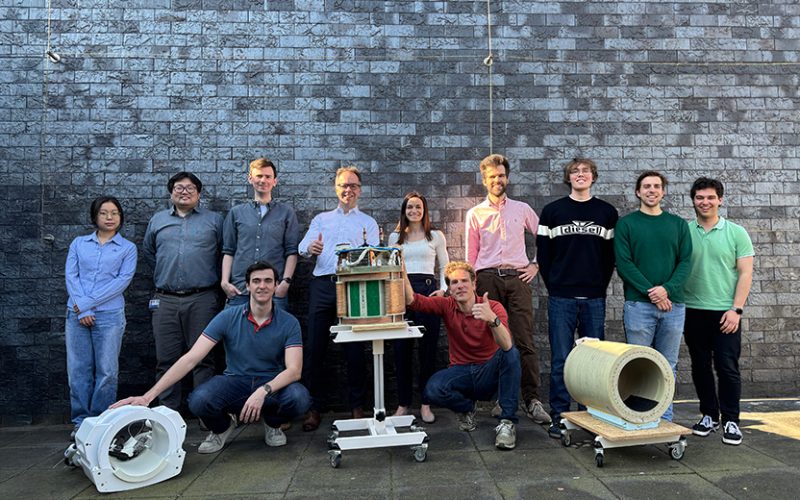In the world of modern research, innovation rarely occurs in isolation. In this series, we highlight a new research team each month, talking about how teamwork is essential for making their science work. This month in the spotlight: the MRI gradient team.
During the Research Days last October, the annual UMC Utrecht Team Science Award was awarded to team Neo-BRAIN. However, Team Science thrives across many other research teams at UMC Utrecht. Here, the MRI gradient team tells how their teamwork helps to push the limits of MRI technology for faster and better imaging.
The MRI gradient team focuses on developing advanced technology for MRI scanners to produce clearer images. These innovations support clinicians in real-world settings, for example to better analyze the microstructure of brain tissue, enhancing diagnosis and treatment planning. The team is also working on faster, quieter MRI scans, making the experience more comfortable for patients. Their high-performance technology for MRI scanners is mainly used for specialized imaging techniques like looking at the movement of water in tissues, blood flow, and brain activity. “Our research is not limited to hardware – we are also developing new software to fully exploit the capabilities of these improved MRI systems, ensuring the best possible images and data from every scan,” the team explains. Their combined focus on hardware and software leads to better diagnostics and a more pleasant scanning experience for patients.
“Our team brings together different disciplines, including engineering, physics, and clinical translation, creating a multidisciplinary environment essential for advancing MRI technology. Our work benefits from constant input from different perspectives, allowing for the integration of high-performance hardware developments with novel software and imaging techniques. Through collaboration with clinical teams, we can apply our advanced MRI technologies directly to critical areas like small vessel disease, Alzheimer’s, ALS, breast cancer, and neurological disorders. Ultimately, we aim to integrate these advanced MRI technologies into automated, AI-based scanning systems, making high-quality diagnostics more accessible and reducing pressure on healthcare systems.”
“Significant progress has been made in the development of ultrasonic (silent) gradients, enabling high-resolution and fast imaging at 7 and 3 Tesla. Tesla represents the strength of the magnet in the MRI-scanner. We’re also translating the technology to improve the patient experience in clinical 3T applications, for example with quieter and faster imaging for more comfortable and efficient clinical workflow. Another key focus is advancing diffusion imaging, functional imaging, and flow imaging, which are specialized types of MRI, to get clearer images. Our innovations directly address important needs in medical imaging: better image quality, faster scan times, and improved patient comfort. This is especially important for sensitive groups like children, pregnant women, and elderly patients. This enhanced diagnostic accuracy and patient experience in clinical settings leads to better healthcare outcomes.”
“Harder, Better, Faster, Stronger. This motto captures our spirit: we are always looking for ways to improve and to move boundaries. We promote open communication, shared responsibility, and a non-hierarchical structure where every team member can contribute ideas. Regular team-building activities and student-led initiatives create a positive, dynamic, and supportive environment where everyone feels valued.”
“The team is highly diverse: different career stages, nationalities, departments, and expertise come together in close collaboration. Our team leaders are Jeroen Siero (associate professor), Chantal Tax (associate professor), and Edwin Versteeg (assistant professor), and our team members are Dennis Klomp (professor), Jannie Wijnen (associate professor), Alberto De Luca (assistant professor), Kyung Min Nam (PhD candidate), Thomas Roos (PhD candidate), Leon Arends (PhD candidate), Michael McGrory (PhD candidate), Rik Weersink (MSc student), Elles Dobbelaar (MSc student), Erik van Riel (MSc student), Kaiqi Meng (MSc student), Jiaxin Zhang (MSc student), and Bas de Witte (BSc student). They work across different research groups within the division Imaging & Oncology and Brain: the High Field Group, Image Sciences Institute, Translational Neuroimaging, PROVIDI Lab, Metabolic Imaging, Platform MRI Team, Computational Imaging Group, and Radiotherapy.”
Read this article about Team JointCare.
Read this article about the winner of the 2024 Team Science Award, Team Neo-BRAIN.
